"I want to see the full shape of the country"
Veteran Tran Van Thanh (76 years old) traveled from Vinh, Nghe An since the afternoon of August 21, in a "Dream" car. He carried a pink suitcase, a small wooden box containing personal belongings, and a red flag with a yellow star on the back of the vehicle. Coming to Hanoi on August 23 when it was dark, with all the dust on his body on the road and sunburned skin. However, he still smiled and talked about his journey.
He was a soldier who directly fought to protect the ancient citadel of Quang Tri in 1972, More than 50 years have passed, those 81 days and nights are still heroic memories. His stories about the days of staying in the "bomb bag" of Quang Tri are still as clear as yesterday!
In April 1968, he enlisted in the army, stationed in Company C9, Battalion 3, Regiment K3 Tam Dao. That year, the young man was 25 years old, unmarried, and went to Quang Tri to protect the ancient citadel.
Before entering the fierce matches, he and his teammates had gone through a month of training. At that time, he held the rank of deputy platoon leader, and the platoon leader was Mr. Han Duy Long - who later became a Hero of the People's Armed Forces.
On the day he entered the battlefield, he and his teammates read the oath of the Vietnam People's Army. He remembers as if he had written a message to the soldiers of K3 Tam Dao: "Now that you are standing in the land of the South, we must protect the people of the South to the last breath". The whole unit at that time shouted "determined, determined".
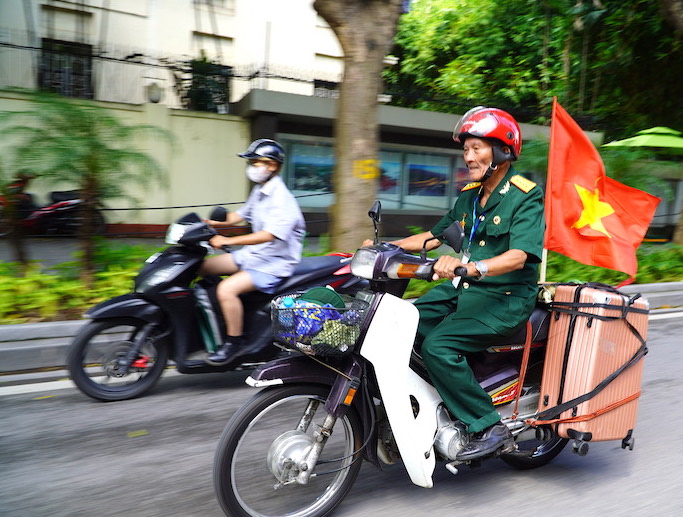
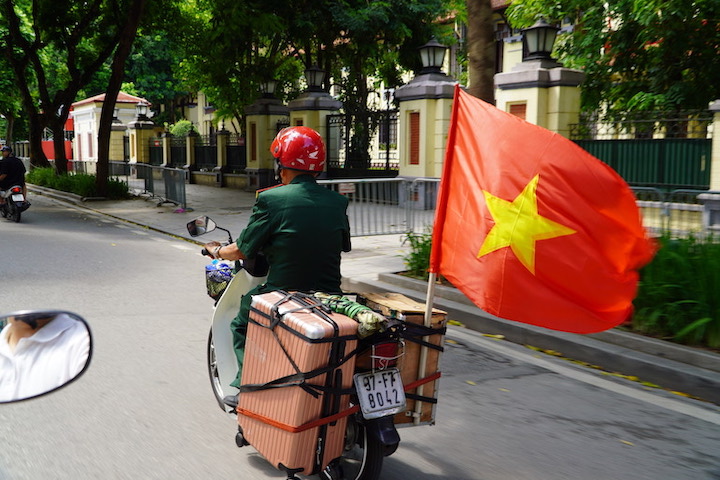
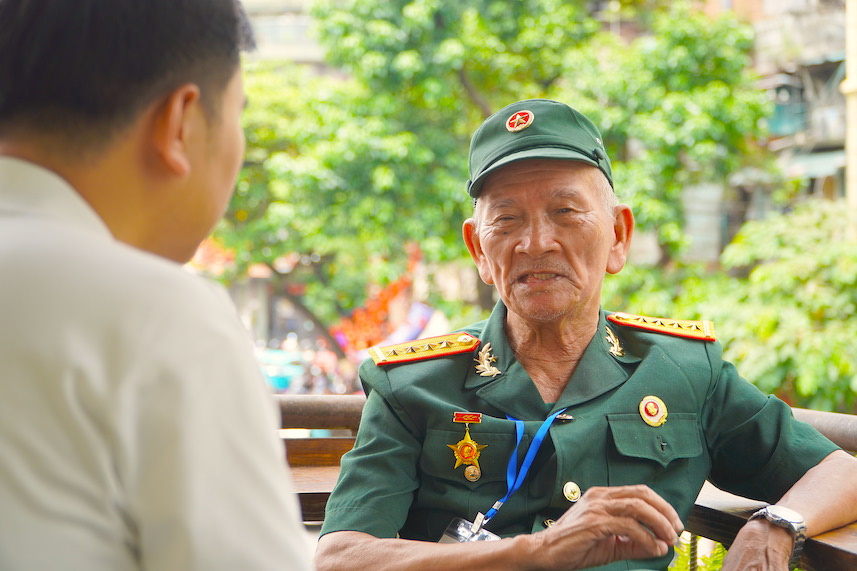
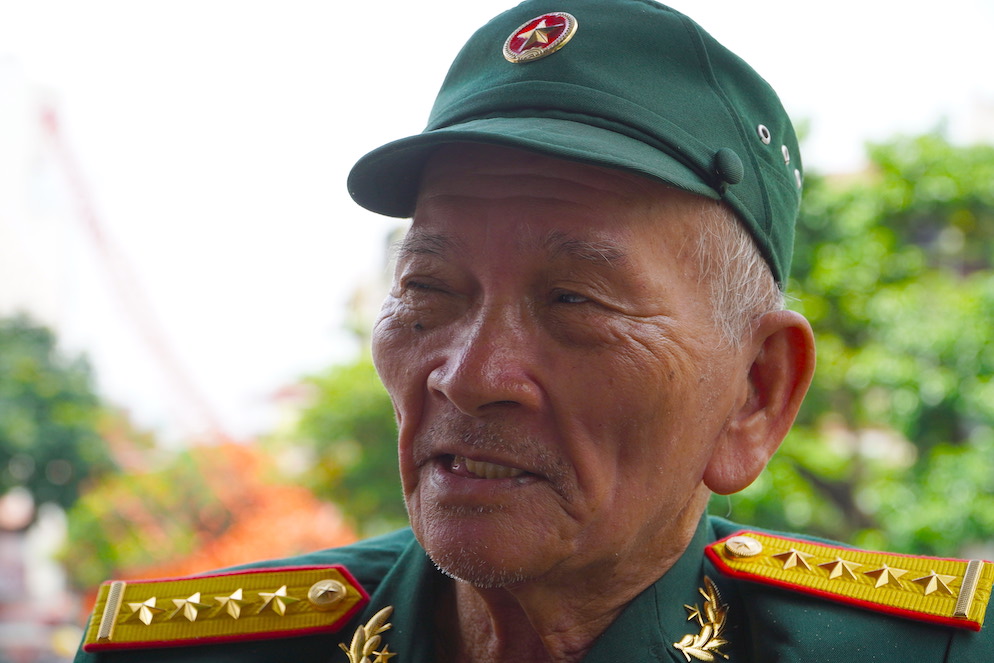
For 81 fierce days and nights, he and his teammates fought in the rain of bombs and bullets, as he said, "the fierceness of the war cannot be fully expressed in words". Using strong firepower, from medium-range artillery, mortars to medium-range guns... continuously firing heavy shots at our army. The roar of the firecrackers on the head, the ground was covered with a bomb hole, and the smell of gunpowder was thick.
"There were days when thousands of tons of bombs fell on the ancient citadel. nothing could be put up with it. No house is intact. In the unit's command tunnel, when the enemy dropped bombs, the comrades outside all died," he said. However, the K3 Tam Dao army was determined to stay and fight bravely, taking and inching forward, determined to take the peak of 30.
"The blood and bones of our comrades have seeped into every measure of the ancient citadel when thousands of people fell down. The citadel is wide, but my comrades are lying there," he choked up.
After leaving the war, he returned to his daily life, but still painfully remembered the old battlefields, remembered his comrades who had fallen along the Thach Han River. In a story with reporters, veteran Tran Van Thanh said that many years later, when he returned to a martyrs' cemetery in Quang Tri province, he revived those memories.
He said that a comrade from the K3 Tam Dao team sacrificed himself on the southern bank of the Thach Han River, but the grave was later erected on the northern bank. In April 2025, on a motorbike trip from Nghe An to Ho Chi Minh City to attend the parade to celebrate the Liberation of the South (April 30). Despite his fatigue, he still took the opportunity to visit Vinh Linh cemetery with his comrade's family to light incense.
"That is a condition. If I cannot burn incense for my comrades, I will regret it for life," he said.
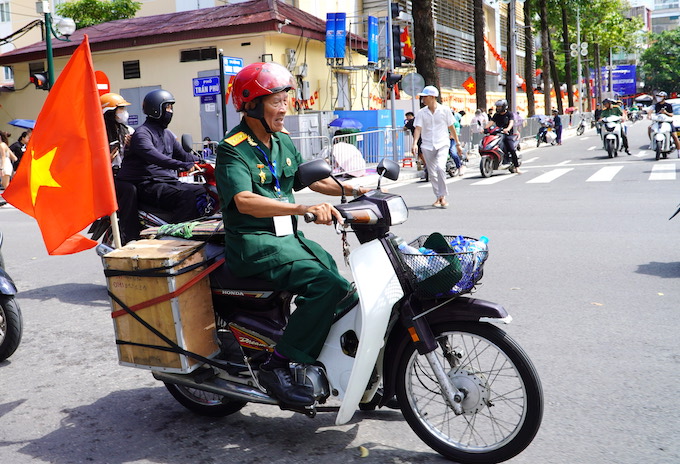
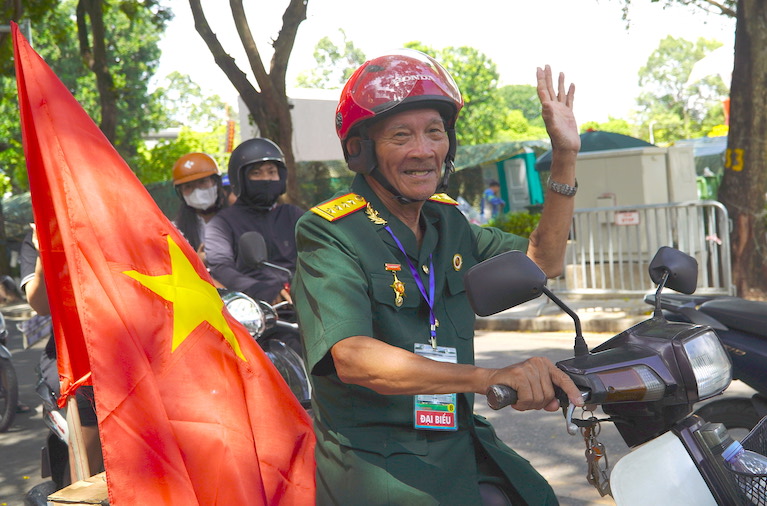
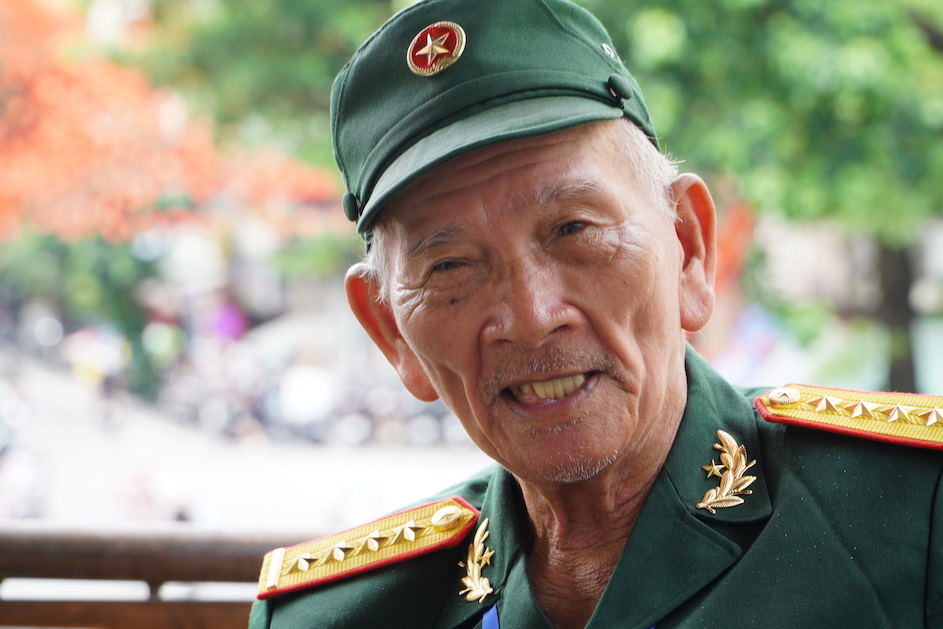
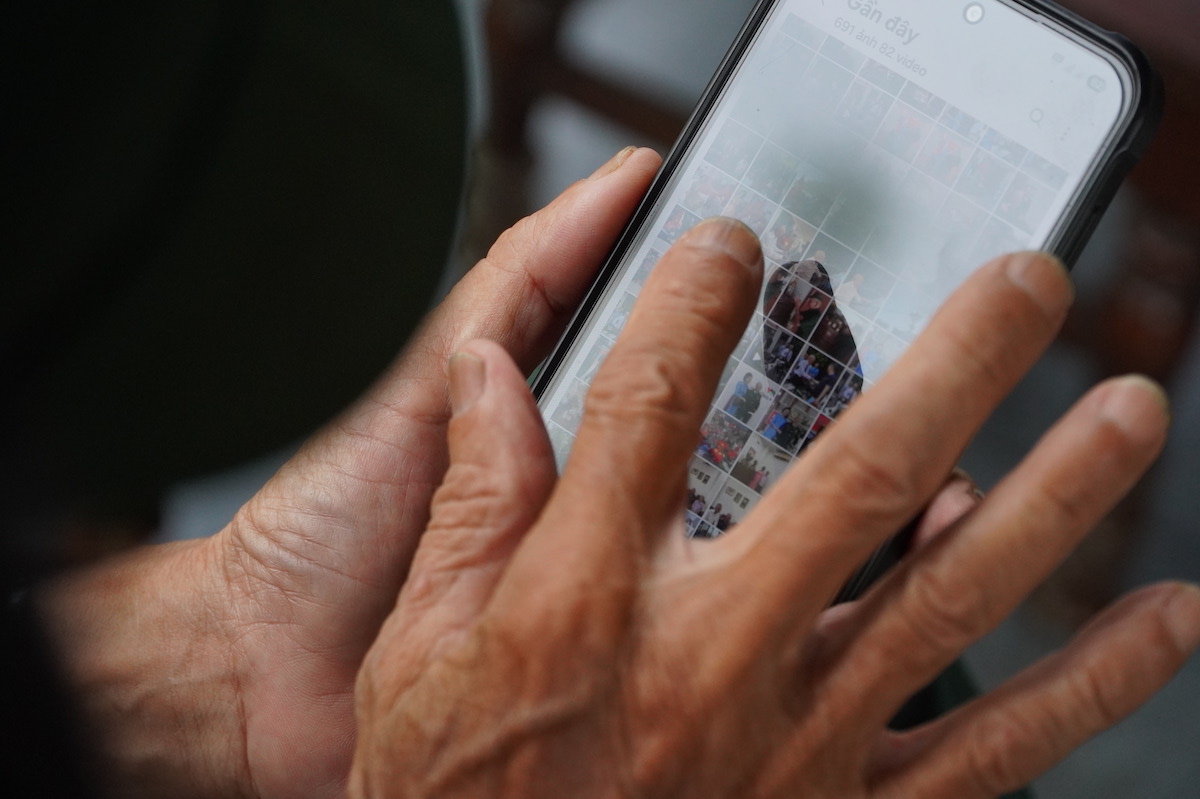
This time going to Hanoi to watch the parade and parade to celebrate the 80th anniversary of the August Revolution and National Day on September 2, Mr. Thanh "keeps a secret" with his relatives for fear of people worrying. While his wife was at the market, he quietly brought his luggage to the car, then "escaped his wife" and headed straight to the capital to join the people to watch the first general parade and parade program to serve the 80th anniversary of National Day on September 2.
When he arrived at National Highway 1A, he called his wife and children to inform them about the trip. This journey is for him a way to witness the changes and development of the country and fulfill his wish to see the thousand-year-old capital.
"Now the economy is on the rise, people can choose trains, airplanes, and cars to go to Hanoi. But for me, a retired soldier, I chose a motorbike to be able to fully see every piece of land of the Fatherland. Every time I pass by, I feel proud that my country is changing day by day".
He believes that that journey requires not only health, but also spirit and determination.
"I would like to send a message to today's young generation: Our ancestors have donated blood and bones to protect every piece of land of the Fatherland, so now you should use your intelligence to build our country more and more dignified and more beautiful".
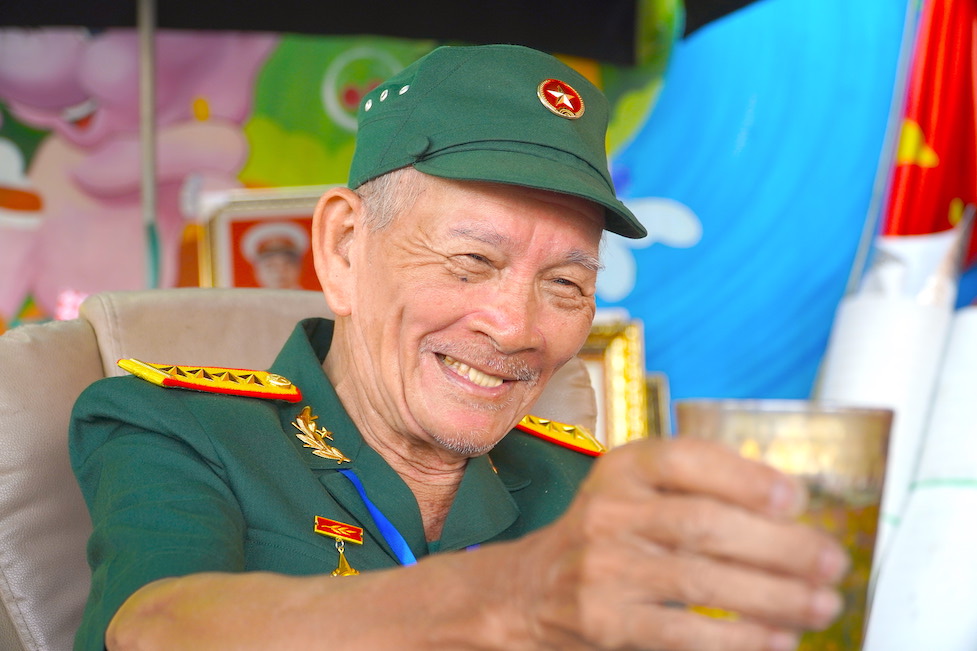
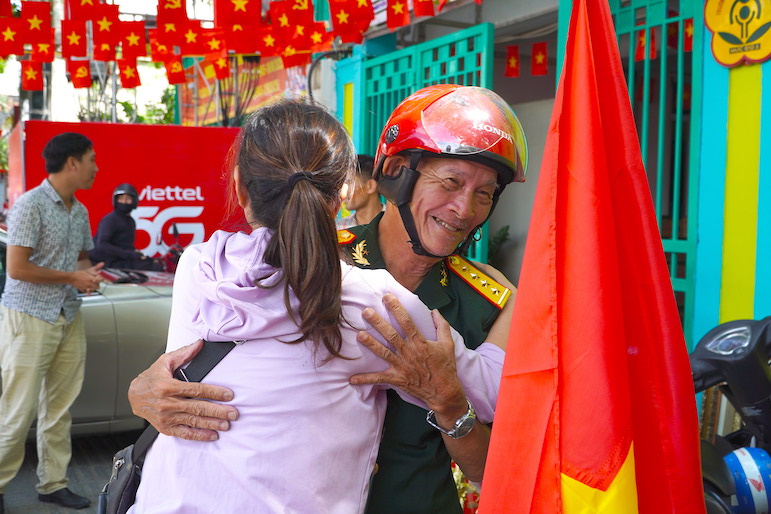
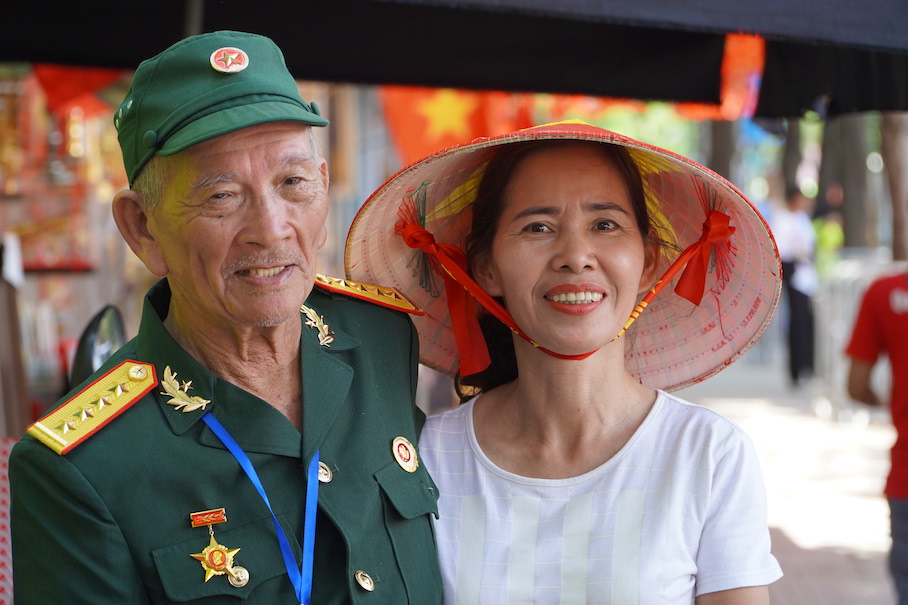
A patriotic young generation
The trip of veteran Tran Van Thanh caused strong emotions for many people. Moved not only by the joy of seeing each piece of land of the country after many changes, but also by the flowing memories when remembering old comrades - those who were no longer present on today's happy day of the Fatherland.
Along with the memories of veterans, perhaps another image also surprised and moved many people no less than the attitude of today's young generation towards the past, towards the history of the nation, to paint a beautiful picture of gratitude to the young generation.
During the days when people from all over the country flocked to Hanoi to watch the parade and parade to celebrate National Day on September 2, I met Le Minh Hanh (33 years old), a volunteer at the Center for Legal Consulting and Legal Assistance for martyrs' families. For many years, she has regularly helped, advised and accompanied relatives of martyrs to find graves across the edges of the land.
Hanh was born into a family with a revolutionary tradition. Her father was a son of a martyr who fought against France. He was a pre-upprising cadre, with merits in the August 1945 General Uprising.
His mother's brother, martyr Khuat Minh Dung, died on the battlefield of A Luoi, Hue in 1973 - when he was only 20 years old. Since high school years, Hanh has seen her mother collect every piece of information to find the grave of martyr Khuat Minh Dung. She said that it was her mother's first time coming to A Luoi district (Hue), but could not determine the location, so she brought a handful of red soil on the side of the road back and placed it on the uncle's altar.
"My father was in the 324th Division. Later, the family contacted the Communications Department of the year of his uncle's enlistment and met old teammates. However, due to the impact of war, old age, and memories of old men when they forget them, connecting information is extremely difficult. The family has searched many times, and it was not until the fourth time that they could determine his resting place," she said.
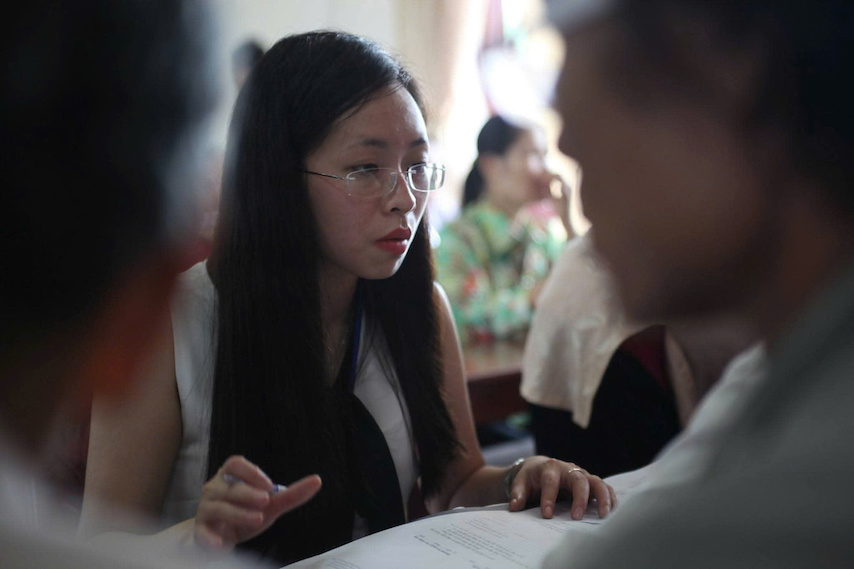
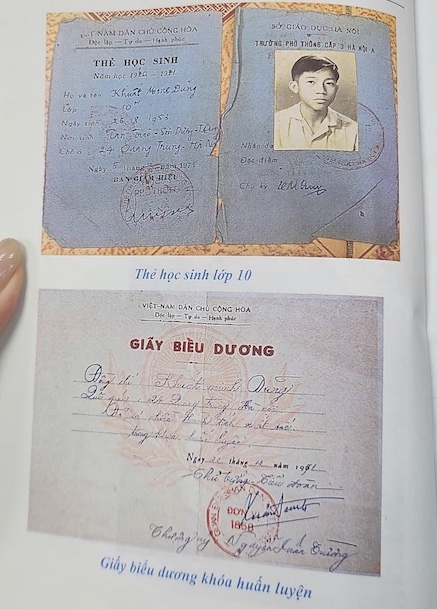
It was not until 2008 that the family found the place where his uncle died. Next, they found the remains of the old man with a hammock on the top of Pahy mountain (A Luoi, Thua Thien Hue).
"Without the help of many agencies and friends, especially the camaraderie of brothers C10 (Group 10), perhaps the family would not have been able to find a place to bury the coffin. This is a luckier thing than many other martyrs' families.
Every time I talk about him, my family is very proud. Although the war has passed, memories of Uncle Ho, stories about the years of evacuation, and his grief are still unforgettable. That is also the motivation that helped me become a volunteer at the Center for Legal Consulting and Legal Assistance for martyrs' families," said Ms. Hanh.
According to Ms. Hanh, the journey to find a martyr's grave is a "long-term battle", requiring the sum of knowledge, funding, health, analytical ability and especially the joint efforts of many people, even needing luck to hope to find a clue.
Each situation of finding a martyrs grave is a separate story. Each family preserves different memories, and each martyr also sacrifices in different circumstances. Therefore, empathy is very important to be able to advise the relatives of martyrs.
They need to understand that this journey is not easy, especially in the Central region - where the weather is harsh and there is erratic rain and sunshine. Even keeping a part of the grave is a story. There are cases where a martyr has just been buried but immediately after that a bomb falls, the grave immediately disappears," Hanh shared.
Those who have been to the Central region, coming to martyrs' cemeteries, will see tens of thousands of graves stretching out, every commune has a cemetery, including thousands of graves that have not been identified.
Many times volunteers have to advise relatives to understand and accept the fierceness of war, that their martyrs have transformed into the shape of the country. No matter where you sacrifice, that place is your motherland, your homeland.
"The important thing is not only to find a handful of grave land, but to educate today's children about the generation that sacrificed themselves to have today," Hanh said.
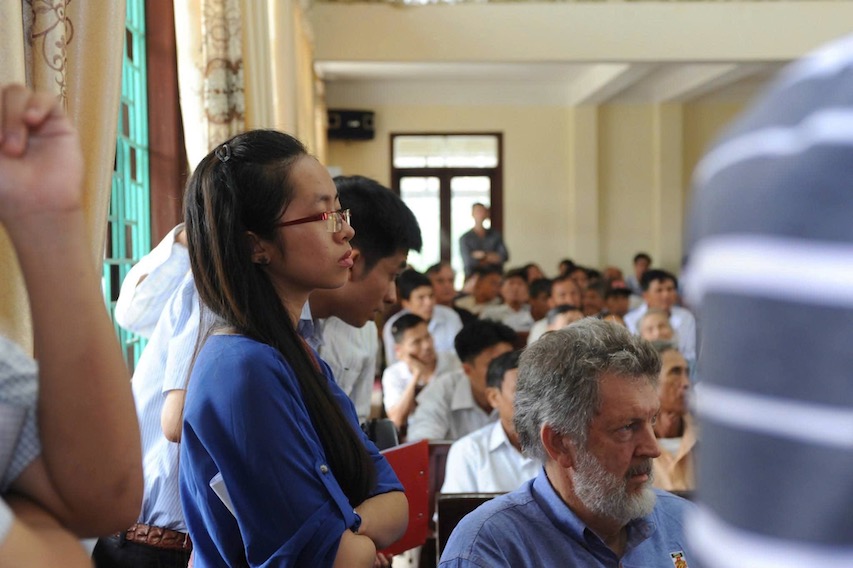
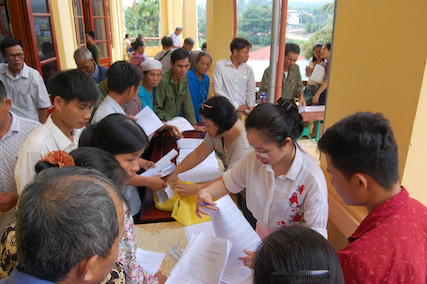
On those journeys, Hanh heard countless stories from veterans and martyrs' relatives. Living in their emotions, absorbing the great pain and loss, she understands more deeply the value of peace, and from there is a better sense of having to live more responsibly for herself and for society.
During the days when the country celebrates the 80th anniversary of National Day on September 2, all roads and alleys are flooded with flags and flowers, many young people flock to Hanoi to watch parades, parade, meet, and chat with veterans, Hanh clearly feels that the young generation is looking towards the past, towards historical milestones.
"It is a positive signal, helping people not forget the past, not forget the fallen generation in the form of the Fatherland. I hope that this will not stop at the moment, momentarily, but will continue," she expressed.
Recalling the photos at the ceremony, Hanh was moved to see veterans from many provinces returning to Hanoi to participate in the parade. Many men do not have a place to rest, but have been supported by young people and organizations to arrange accommodation, even taking good positions to watch the army pass. " Those are really things that moved me a lot," Hanh said.











